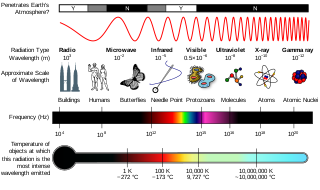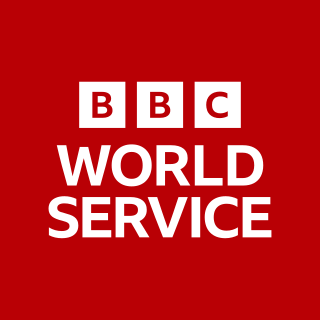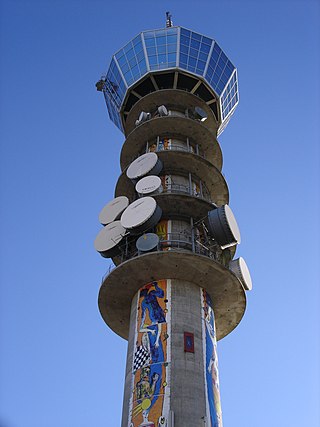
The electromagnetic spectrum is the full range of electromagnetic radiation, organized by frequency or wavelength. The spectrum is divided into separate bands, with different names for the electromagnetic waves within each band. From low to high frequency these are: radio waves, microwaves, infrared, visible light, ultraviolet, X-rays, and gamma rays. The electromagnetic waves in each of these bands have different characteristics, such as how they are produced, how they interact with matter, and their practical applications.

Morse code is a telecommunications method which encodes text characters as standardized sequences of two different signal durations, called dots and dashes, or dits and dahs. Morse code is named after Samuel Morse, one of the early developers of the system adopted for electrical telegraphy.

The Hitchhiker's Guide to the Galaxy is a comedy science fiction franchise created by Douglas Adams. Originally a 1978 radio comedy broadcast on BBC Radio 4, it was later adapted to other formats, including novels, stage shows, comic books, a 1981 TV series, a 1984 text adventure game, and 2005 feature film.

The BBC World Service is an international broadcaster owned and operated by the BBC. It is the world's largest external broadcaster in terms of reception area, language selection and audience reach. It broadcasts radio news, speech and discussions in more than 40 languages to many parts of the world on analogue and digital shortwave platforms, internet streaming, podcasting, satellite, DAB, FM and MW relays. In 2024, the World Service reached an average of 450 million people a week. In November 2016, the BBC announced that it would start broadcasting in additional languages including Amharic and Igbo, in its biggest expansion since the 1940s.

The Canadian Broadcasting Corporation, branded as CBC/Radio-Canada, is the Canadian public broadcaster for both radio and television. It is a Crown corporation that serves as the national public broadcaster, with its English-language and French-language service units known as CBC and Radio-Canada, respectively.

BBC Radio 4 is a British national radio station owned and operated by the BBC. The station replaced the BBC Home Service on 30 September 1967 and broadcasts a wide variety of spoken-word programmes from the BBC's headquarters at Broadcasting House, London. Since 2019, the station controller has been Mohit Bakaya. He replaced Gwyneth Williams, who had been the station controller since 2010.

Radio waves are a type of electromagnetic radiation with the lowest frequencies and the longest wavelengths in the electromagnetic spectrum, typically with frequencies below 300 gigahertz (GHz) and wavelengths greater than 1 millimeter, about the diameter of a grain of rice. Radio waves with frequencies above about 1 GHz and wavelengths shorter than 30 centimeters are called microwaves. Like all electromagnetic waves, radio waves in a vacuum travel at the speed of light, and in the Earth's atmosphere at a slightly lower speed. Radio waves are generated by charged particles undergoing acceleration, such as time-varying electric currents. Naturally occurring radio waves are emitted by lightning and astronomical objects, and are part of the blackbody radiation emitted by all warm objects.

AM broadcasting is radio broadcasting using amplitude modulation (AM) transmissions. It was the first method developed for making audio radio transmissions, and is still used worldwide, primarily for medium wave transmissions, but also on the longwave and shortwave radio bands.

Radio broadcasting is the broadcasting of audio (sound), sometimes with related metadata, by radio waves to radio receivers belonging to a public audience. In terrestrial radio broadcasting the radio waves are broadcast by a land-based radio station, while in satellite radio the radio waves are broadcast by a satellite in Earth orbit. To receive the content the listener must have a broadcast radio receiver (radio). Stations are often affiliated with a radio network that provides content in a common radio format, either in broadcast syndication or simulcast, or both. The encoding of a radio broadcast depends on whether it uses an analog or digital signal. Analog radio broadcasts use one of two types of radio wave modulation: amplitude modulation for AM radio, or frequency modulation for FM radio. Newer, digital radio stations transmit in several different digital audio standards, such as DAB, HD radio, or DRM.

Radio Free Europe/Radio Liberty (RFE/RL) is an American government-funded international media organization that broadcasts and reports news, information, and analyses to Eastern Europe, Central Asia, the Caucasus, and the Middle East. RFE/RL is a private 501(c)(3) corporation and is supervised by the U.S. Agency for Global Media, an independent government agency overseeing all international broadcasting services that receive American government support. Nicola Careem is the organization's editor-in-chief. It was established during the early Cold War, with the goal of providing reliable and independent news to audiences living under authoritarian regimes, particularly in the Soviet Union and the Eastern Bloc.
The Billboard Hot 100 is the music industry standard record chart in the United States for songs, published weekly by Billboard magazine. Chart rankings are based on sales, online streaming, and radio airplay in the U.S.

All India Radio (AIR), also known as Akashvani, is an Indian state-owned public radio broadcaster founded by the Government of India, owned by the Ministry of Information and Broadcasting and one of Prasar Bharati's two divisions. It was established in 1936. It is the sister service of Prasar Bharati's Doordarshan, an Indian television broadcaster. Headquartered in the Akashvani Bhavan building in New Delhi, it houses the Drama Section, the FM Section, and the National Service, and is also home to the Indian television station Doordarshan Kendra, (Delhi).

Mediacorp Pte. Ltd. is the state-owned public media conglomerate of Singapore. Owned by Temasek Holdings—the investment arm of the Government of Singapore—it owns and operates television channels, radio, and digital media properties. It is headquartered at the Mediapolis development in Queenstown's One-north precinct, which succeeded Caldecott Hill—the long-time home of its predecessors—in 2015; as of 2022, Mediacorp employs over 3,000 employees; a large number of them are in both public and private sector broadcasting.

FM broadcasting is a method of radio broadcasting that uses frequency modulation (FM) of the radio broadcast carrier wave. Invented in 1933 by American engineer Edwin Armstrong, wide-band FM is used worldwide to transmit high-fidelity sound over broadcast radio. FM broadcasting offers higher fidelity—more accurate reproduction of the original program sound—than other broadcasting techniques, such as AM broadcasting. It is also less susceptible to common forms of interference, having less static and popping sounds than are often heard on AM. Therefore, FM is used for most broadcasts of music and general audio. FM radio stations use the very high frequency range of radio frequencies.

The Voice of Vietnam is the Vietnamese national radio broadcaster. Directly run by the government of Vietnam alongside the Vietnam Television (VTV) and the Vietnam News Agency (VNA), VOV is tasked with promoting the policies of the Communist Party and the laws of the state.

Radio is the technology of communicating using radio waves. Radio waves are electromagnetic waves of frequency between 3 hertz (Hz) and 300 gigahertz (GHz). They are generated by an electronic device called a transmitter connected to an antenna which radiates oscillating electrical energy, often characterized as a wave. They can be received by other antennas connected to a radio receiver, this is the fundamental principle of radio communication. In addition to communication, radio is used for radar, radio navigation, remote control, remote sensing, and other applications.
The British Broadcasting Corporation (BBC) is a British public service broadcaster headquartered at Broadcasting House in London, England. Originally established in 1922 as the British Broadcasting Company, it evolved into its current state with its current name on New Year's Day 1927. The oldest and largest local and global broadcaster by stature and by number of employees, the BBC employs over 21,000 staff in total, of whom approximately 17,200 are in public-sector broadcasting.

Amateur radio, also known as ham radio, is the use of the radio frequency spectrum for purposes of non-commercial exchange of messages, wireless experimentation, self-training, private recreation, radiosport, contesting, and emergency communications. The term "amateur" is used to specify "a duly authorized person interested in radioelectric practice with a purely personal aim and without pecuniary interest" ; and to differentiate it from commercial broadcasting, public safety, or professional two-way radio services.
iHeartRadio is an American freemium broadcast, podcast and radio streaming platform owned by iHeartMedia. It was founded in August 2008 and iHeartRadio serves as the national umbrella brand for iHeartMedia's radio network, the largest radio broadcaster in the United States with 128 million registered users as of 2019 and its other consumer-facing brands. Its main radio competitors are Audacy, TuneIn and Sirius XM.

National Public Radio is an American public broadcasting organization headquartered in Washington, D.C., with its NPR West headquarters in Culver City, California. It serves as a national syndicator to a network of more than 1,000 public radio stations in the United States. It differs from other non-profit membership media organizations, such as the Associated Press, in that it was established by an act of Congress.















